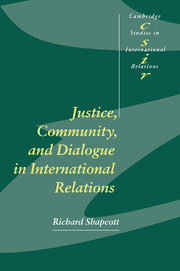Book contents
- Frontmatter
- Contents
- Acknowledgements
- Introduction
- 1 Beyond the cosmopolitan/communitarian divide
- 2 Community and communication in interpretive theories of international relations
- 3 Emancipation and legislation: the boundaries of conversation in poststructuralism and the critical theory of IR
- 4 Philosophical hermeneutics: understanding, practical reasoning and human solidarity
- 5 Philosophical hermeneutics and its critics
- 6 Towards a thin cosmopolitanism
- Conclusion
- Bibliography
- Index
- CAMBRIDGE STUDIES IN INTERNATIONAL RELATIONS
4 - Philosophical hermeneutics: understanding, practical reasoning and human solidarity
Published online by Cambridge University Press: 22 September 2009
- Frontmatter
- Contents
- Acknowledgements
- Introduction
- 1 Beyond the cosmopolitan/communitarian divide
- 2 Community and communication in interpretive theories of international relations
- 3 Emancipation and legislation: the boundaries of conversation in poststructuralism and the critical theory of IR
- 4 Philosophical hermeneutics: understanding, practical reasoning and human solidarity
- 5 Philosophical hermeneutics and its critics
- 6 Towards a thin cosmopolitanism
- Conclusion
- Bibliography
- Index
- CAMBRIDGE STUDIES IN INTERNATIONAL RELATIONS
Summary
Every conversation presupposes a common language, or better, creates a common language. Something is placed in the centre, as the Greeks say, which the partners in dialogue both share, and concerning which they can exchange ideas with one another. Hence reaching an understanding on the subject matter of a conversation necessarily means that a common language must first be worked out in the conversation … in a successful conversation they both come under the influence of the truth of the object and are thus bound to one another in a new community. To reach an understanding in dialogue is not merely a matter of putting oneself forward and successfully asserting one's own point of view, but being transformed into communion in which we do not remain what we were.
Chapter 2 identified Mark Neufeld's claim that the goal of a critical theory of international relations was the recreation of the Aristotelian polis on the global scale. Linklater's use of Habermasian discourse ethics, it was argued, had been the most successful attempt to think about how to proceed with this aim. Discourse ethics, Linklater argued, provided one conceptualisation of what such a recreation might look like. In Linklater's project the global polis, in order to be both inclusive and just, must necessarily take the form of a ‘thin’ cosmopolitan community modelled on discourse ethics. Chapter 3 argued that certain limits applied to this model as a result of its commitment to a strictly proceduralist, deontological conversation.
- Type
- Chapter
- Information
- Justice, Community and Dialogue in International Relations , pp. 130 - 179Publisher: Cambridge University PressPrint publication year: 2001

